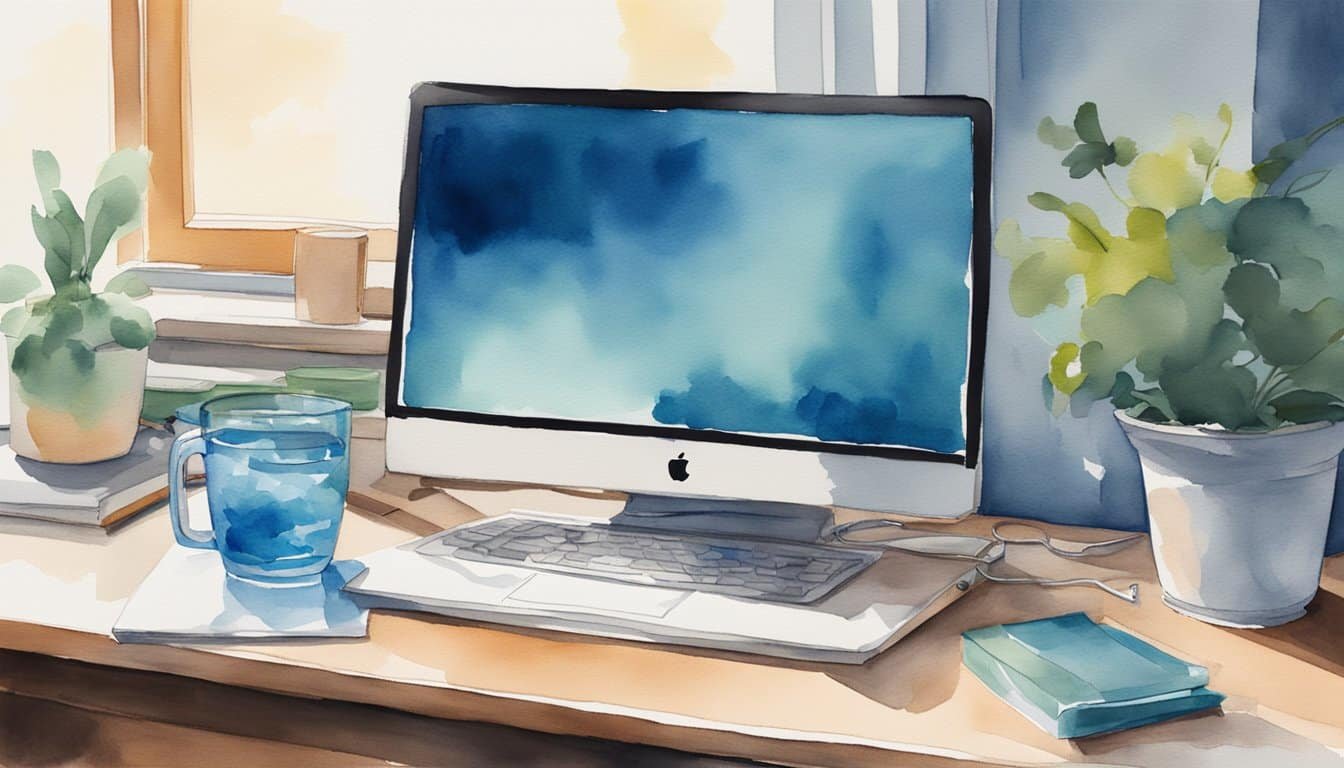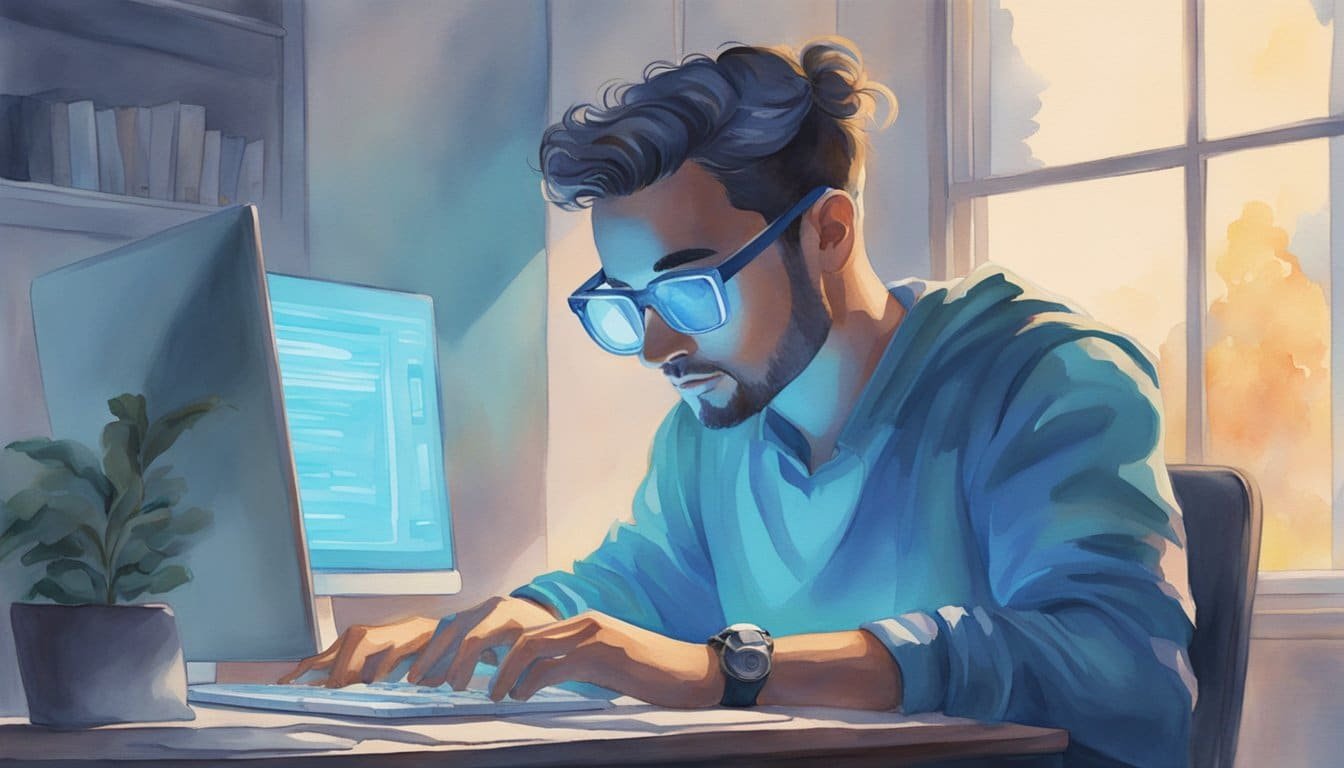Understanding Blue Light and Health
Blue light is everywhere, from the glow of our devices to the very sunlight we bask in. It’s vitality to understanding our health is undeniable, intertwining our vision, sleep, and potentially much more.
The Science of Blue Light
Blue light, part of the visible light spectrum, packs a high energy punch with shorter wavelengths. These energetic blue rays are present in sunshine, supplying us with myriad benefits, yet they’re also emitted from screens, raising concerns about potential blue-light hazard. Unlike ultraviolet light, blue light reaches deep into the eye, which is where its interaction with our well-being begins.
Health Impacts of Blue Light Exposure
Exposure to blue light is a double-edged sword. It sharpens our attention and mood during daylight hours. However, there’s a growing body of research examining how these high-energy waves may incur phototoxicity and contribute to eye strain. Particularly for those spending significant time in front of screens, whether for work or leisure, it’s a point of consideration for eye health.
Role of Blue Light in Sleep
Our sleep-wake cycles, or circadian rhythms, dance to the tune of light exposure. Blue light has the power to halt the production of the sleep-inducing hormone melatonin, which is why evenings spent with screens can lead to restless nights. Understanding this biological interplay shines a light on the importance of filtering blue rays as dusk falls, not just for sleep but for overall circadian rhythm health.
Blue Light Glasses and Their Functionality

Blue light glasses have piqued the interest of anyone who spends significant time in front of screens. They are designed to mitigate some of the negative effects our digital lives have on our eyes and sleep patterns.
How Blue Light Glasses Work
Blue light glasses essentially have lenses that act as filters. They are crafted to block or absorb blue light emitted from LED screens found on devices such as smartphones, computers, and tablets. As screen time escalates, these glasses are becoming a common accessory on many desks. Studies suggest that reducing exposure to blue light, especially before bedtime, can improve sleep quality by aiding the body’s natural circadian rhythms – its internal clock.
The mechanics behind blue-blocking lenses revolve around their ability to target and reduce the transmission of blue light wavelengths, which are known for their high energy and potential to cause eye strain. This light doesn’t just affect vision; it impacts alertness and could arguably be a cause of disrupted sleep patterns. By using these glasses, individuals might notice diminished glare and a decrease in the sensitivity to light, especially during evening hours when blue light sensitivity is more pronounced.
Effectiveness of Blue Light Glasses on Vision and Sleep
Opinions on the effectiveness of blue light glasses can vary; however, empirical evidence is emerging. A study highlights the potential benefits of blue light-blocking glasses in improving one’s vision performance by reducing glare and discomfort from prolonged screen use, ultimately supporting eye care.
When it comes to sleep quality, the relationship between blue light exposure from screens and rest has been under the microscope. Night mode settings on gadgets are one attempt to reduce blue light exposure, but glasses with special lenses provide another layer of defense. They’re being studied for their beneficial impact on people who engage in night shift work or those with considerable screen time before bedtime.
So while a night spent binging on the latest series or scrolling through social feeds might be enjoyable, donning a pair of blue-blocking glasses could be a smart move for the sake of one’s eyes and the quest for a good night’s slumber.
Practical Tips and Considerations

When seeking ways to mitigate the impacts of artificial blue light from digital devices, it’s crucial to consider both eyewear options and lifestyle habits. These choices are vital for maintaining optimal eye health and can help alleviate symptoms such as dry eyes, headaches, and fatigue.
Choosing the Right Blue Light Glasses
Selecting blue light glasses isn’t just about style; it’s about protection. The right pair should have lenses that effectively filter out blue light from digital screens while also correcting any refractive error. One might want to have a vision exam by an optometrist to determine individual needs. Certain studies, like those conducted at the State University of New York, suggest that blue light glasses might improve comfort and reduce eye strain.
Lifestyle Adjustments for Eye Health
Staring at digital devices for prolonged periods can lead to digital eye strain and disturb the natural blink rate, leading to dry eye. They can adopt the 20-20-20 rule, endorsed by the American Academy of Ophthalmology, which suggests taking a 20-second break to view something 20 feet away every 20 minutes. Additionally, ensuring that their work and living areas are well-lit can prevent eye fatigue.
Professional Advice and Studies
While considering blue light glasses, consulting with a retina specialist or an optometrist can provide insights tailored to individual needs. Research, including studies done by Mark Rosenfield from the State University of New York, has highlighted that some blue light glasses may not be as necessary as advertised. Professional advice should always guide one’s choice, especially when findings, as those during the pandemic, indicate increased digital device usage and related insomnia prompts further analysis of blue light’s effects on sleep.

